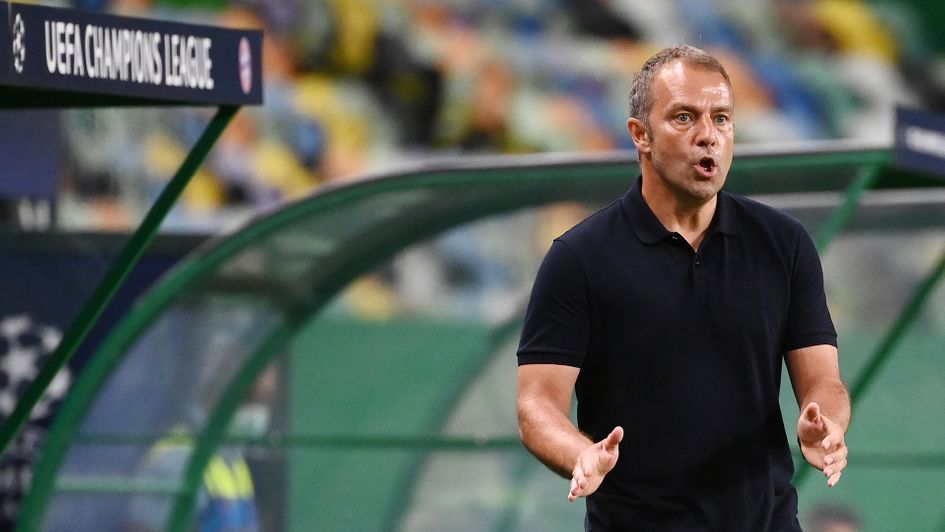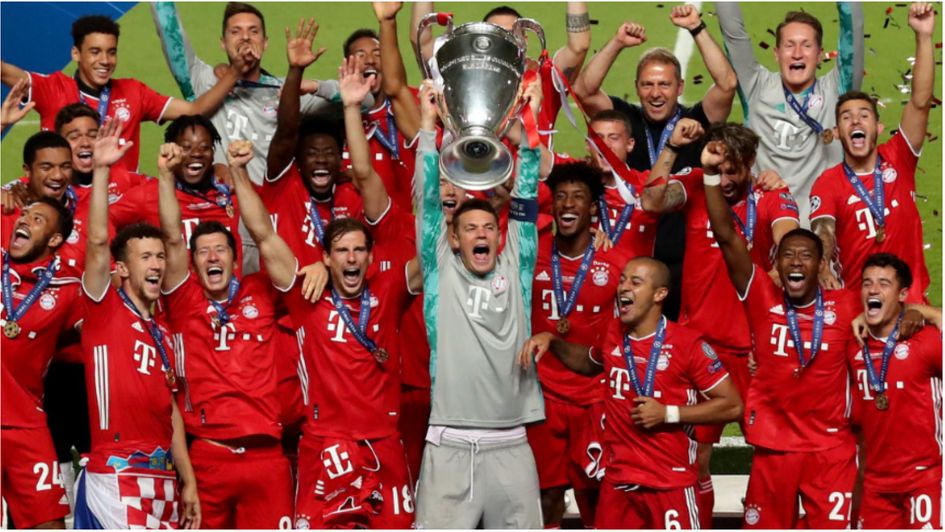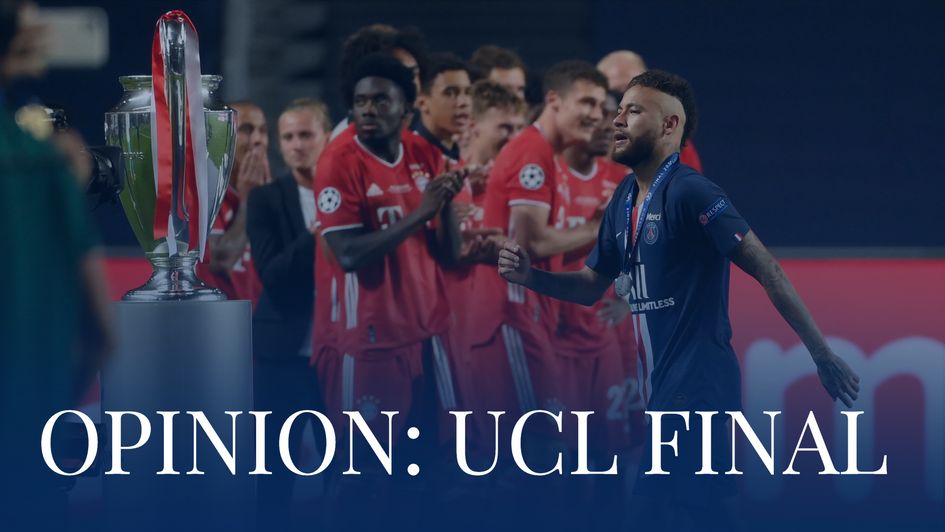In a fractious and juddering Champions League final riddled with nervous energy, it was fitting that the winning goal should be scored by one crystalizing moment of calm; a guided downward header, watched all the way, and measured into the bottom corner.
And it was predictable, too, that it should be Bayern Munich, the serial winners of this competition, who kept their cool when it mattered.
Prior to kick-of it was tempting to overplay the significance of the two sides’ dressing room behaviour following their respective semi-final wins.
Paris Saint-Germain’s wild celebrations were a slightly unsettling juxtaposition to the quiet acceptance among the Germans, and while it would be an unfair characterisation of a strong, combative PSG performance to say they bottled it, by the end of the game the link did feel causal.
Kylian Mbappe snatched at chances, his jerking movements from the left flank a little more anxious than those of Kingsley Coman, the match-winner on Sunday night.
For the first 45 minutes – a tense game, but one full of chances and nearly moments, badly mischaracterised by the BT Sport commentary team – PSG decided to play with caution, sitting deep to invite Bayern Munich forward in the hope of breaking in behind that high defensive line.
It didn’t quite work as planned, but it had been an even contest and certainly the Bayern forwards were limited effectively by Thomas Tuchel’s tactical approach.
But Coman’s goal on the hour mark forced the Parisians to change tack and, as they began to push up the pitch – hunting the ball down, regaining the territory that was willingly conceded until the deadlock was broken – the game became stretched, creating the end-to-end contest many had predicted.
Oddly, both teams were ultimately limited by poor substitutions from their respective manages, Tuchel and Hansi Flick.
The former, the PSG boss, reacted too late, long after their attacking lines had become tired and Neymar had been reduced to attempting to do it all on his own, an individualism developing as desperation set in.
Bringing on the ineffective Eric Maxim Choup-Moting while Mauro Icardi warmed the bench proved as damaging as it had looked at the time.
As for Flick, he is fortunate a late PSG surge never materialised, given that he substituted his two quickest counter-attackers, Coman and Serge Gnabry, just at the moment their opponents were pushing up the pitch.
It proved inconsequential in the end and, on balance, Bayern were the worthy winners, completing their second treble in the last seven years and putting the finishing touches on an extraordinary debut campaign for Flick (below).

Nobody saw this coming: nobody thought a man who hadn’t been in a head coach position for 14 years would succeed like this; nobody thought that Bayern, with 18 points from 10 Bundesliga games in early November, could recover from disaster to enjoy their joint best-ever campaign.
When Arjen Robben and Frank Ribery left the club last summer Bayern had mourned the end of an era, not least because the general perception was of an ageing squad set for a long transitional period. What on earth happened to Bayern’s crisis?
Fast forward a year and the team is littered with star players, whether rejuvenated veterans like Thomas Muller (still only 31 next month, by the way) or emerging superstars like Alphonso Davies.
This team was supposed to be in decline. All of a sudden, seven of their biggest stars – eight, when Leroy Sane arrives - are 25 or younger.
This, then, is the start of a new dynasty for Bayern Munich. They will surely continue on this path for the next two or three years under Flick, one of the great super powers of European football restored to its throne.

And that historical power should not be overlooked, of course, when we come to the meaning of PSG’s defeat, or indeed the hand-wringing in the build-up to Sunday’s game regarding their Qatari ownership and the sovereign wealth that has been pumped into Paris. It is fair to question why Bayern’s historic wealth is seen as more ‘legitimate’ than PSG’s new money, but there is a big difference between the two models.
It would be dishonest to discuss PSG’s project, and achievements this season, without following the money, without acknowledging the purpose of Qatar’s investment.
This is hyper-capitalism at its absolute worst. Qatar bought PSG as a sportswashing exercise. Owning a glittering, glamorous football club is an effective way of leveraging soft power, and for Qatar that means re-branding the nation in a more positive light, deflecting from human rights abuses while accumulating status as part of the wider geo-political cold war in the Middle East.
We can no longer separate football from politics. We must not consider Neymar’s genius without thinking about the thousands of migrants who die in appalling working conditions in Qatar. To do so would be to fall into the very trap they have set for us. Qatar don’t want us to look. It is our apathy that allows sportswashing to be effective.
They have already achieved their goals, of course, and perhaps that is the main takeaway from Sunday’s game.
Tuchel taking PSG all the way to the final, transforming the side from a collection of superstars into a coherent team with a clear tactical vision, is a huge victory in itself. They will challenge again.
They have arrived on the big stage, finally matured into an elite team, finally casting aside their tag of serial bottlers.
Which is to say, Qatar have already won the war. The PSG players bitterly accepting their silver medals; the champions graciously picking their opponents up off the floor; Neymar’s tears: it was glorious failure. It was great entertainment.
For a government attempting to cleanse itself of a global image earned through torture, forced labour, criminalising homosexuality and countless other severe human rights abuses, that is the real victory, and one of far greater consequence than the one celebrated on the streets of Munich.
Follow Sporting Life on social - find us on Facebook here or tweet @SportingLifeFC
Related football content
- Transfer Market: Latest updates
- Transfer Window: Done deals
- Leeds to face Liverpool on opening day
- Premier League: Team-by-team fixtures
- PL odds: City odds-on for title
- 10 fixtures to look out for in new season
- How do promoted teams get on in the Premier League?
- Premier League: Historical points averages
- Latest football previews and tips
- Sporting Life App: Android & iOS









